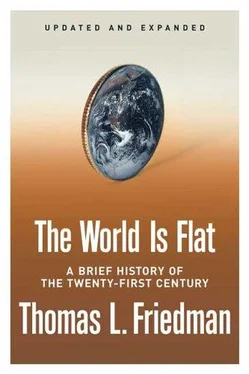The dot-com bust and the flattening of the world forced Glocer to rethink how Reuters delivered news-whether it could disaggregate the functions of a journalist and ship the low-value-added functions to India. His primary goal was to reduce the overlap Reuters payroll, while preserving as many good journalism jobs as possible. “So the first thing we did,” said Glocer, “was hire six reporters in Bangalore as an experiment.
We said, 'Let's let them just do the flash headlines and the tables and whatever else we can get them to do in Bangalore.'“
These new Indian hires had accounting backgrounds and were trained by Reuters, but they were paid standard local wages and vacation and health benefits. “India is an unbelievably rich place for recruiting people, not only with technical skills but also financial skills,” said Glocer. When a company puts out its earnings, one of the first things it does is hand it to the wires-Reuters, Dow Jones, and Bloomberg-for distribution. “We will get that raw data,” he said, “and then it's a race to see how fast we can turn it around. Bangalore is one of the most wired places in the world, and although there's a slight delay-one second or less-in getting the information over there, it turns out you can just as easily sit in Bangalore and get the electronic version of a press release and turn it into a story as you can in London or New York.”
The difference, however, is that wages and rents in Bangalore are less than one-fifth what they are in those Western capitals.
While economics and the flattening of the world have pushed Reuters down this path, Glocer has tried to make a virtue of necessity. “We think we can off-load commoditized reporting and get that done efficiently somewhere else in the world,” he said, and then give the conventional Reuters journalists, whom the company is able to retain, a chance to focus on doing much higher-value-added and personally fulfilling journalism and analysis. “Let's say you were a Reuters journalist in New York. Do you reach your life's fulfillment by turning press releases into boxes on the screen, or by doing the analysis?” asked Glocer. Obviously, it is the latter. Outsourcing news bulletins to India also allows Reuters to extend the breadth of its reporting to more small-cap companies, companies it was not cost-efficient for Reuters to follow before with higher-paid journalists in New York. But with lower-wage Indian reporters, who can be hired in large numbers for the cost of one reporter in New York, it can now do that from Bangalore. By the summer of 2004, Reuters had grown its Bangalore content operation to three hundred staff, aiming eventually for a total of fifteen hundred. Some of those are Reuters veterans sent out to train the Indian teams, some are reporters filing earnings flashes, but most are journalists doing slightly more specialized data analysis-number crunching-for securities offerings.
“A lot of our clients are doing the same thing,” said Glocer. “Investment research has had to have huge amounts of cost ripped out of it, so a lot of firms are using shift work in Bangalore to do bread-and-butter company analysis.” Until recently the big Wall Street firms had conducted investment research by spending millions of dollars on star analysts and then charging part of their salaries to their stockbrokerage departments, which shared the analysis with their best customers, and part to their investment banking business, which sometimes used glowing analyses of a company to lure its banking business. In the wake of New York State Attorney General Eliot Spitzer's investigations into Wall Street practices, following several scandals, investment banking and stockbrokerage have had to be distinctly separated-so that analysts will stop hyping companies in order to get their investment banking. But as a result, the big Wall Street investment firms have had to sharply reduce the cost of their market research, all of which has to be paid for now by their brokerage departments alone. And this created a great incentive for them to outsource some of this analytical work to places like Bangalore. In addition to being able to pay an analyst in Bangalore about $15,000 in total compensation, as opposed to $80,000 in New York or London, Reuters has found that its India employees tend to be financially literate and highly motivated as well. Reuters also recently opened a software development center in Bangkok because it turned out to be a good place to recruit developers who had been overlooked by all the Western companies vying for talent in Bangalore.
I find myself torn by this trend. Having started my career as a wire service reporter with United Press International, I have enormous sympathy with wire service reporters and the pressures, both professional and financial, under which they toil. But UPI might still be thriving today as a wire service, which it is not, if it had been able to outsource some of its lower-end business when I started as a reporter in London twenty-five years ago.
“It is delicate with the staff,” said Glocer, who has cut the entire Reuters staff by roughly a quarter, without deep cuts among the reporters. The Reuters staff, he said, understand that this is being done so that the company can survive and then thrive again. At the same time, said Glocer, “these are sophisticated people out reporting. They see that our clients are doing the exact same things. They get the plot of the story... What is vital is to be honest with people about what we are doing and why and not sugarcoat the message. I firmly believe in the lesson of classical economists about moving work to where it can be done best. However, we must not ignore that in some cases, individual workers will not easily find new work. For them, retraining and an adequate social safety net are needed.”
In an effort to deal straight with the Reuters staff, David Schlesinger, who heads Reuters America, sent all editorial employees a memo, which included the following excerpt:
Off-shoring with Obligation I grew up in New London, Connecticut, which in the 19th century was a major whaling center. In the 1960's and 70's the whales were long gone and the major employers in the region were connected with the military-not a surprise during the Vietnam era. My classmates' parents worked at Electric Boat, the Navy and the Coast Guard. The peace dividend changed the region once again, and now it is best known for the great gambling casinos of Mohegan Sun and Foxwoods and for the pharmaceutical researchers of Pfizer. Jobs went; jobs were created. Skills went out of use; new skills were required. The region changed; people changed. New London, of course, was not unique. How many mill towns saw their mills close; how many shoe towns saw the shoe industry move elsewhere; how many towns that were once textile powerhouses now buy all their linens from China? Change is hard. Change is hardest on those caught by surprise. Change is hardest on those who have difficulty changing too. But change is natural; change is not new; change is important. The current debate about off-shoring is dangerously hot. But the debate about work going to India, China and Mexico is actually no different from the debate once held about submarine work leaving New London or shoe work leaving Massachusetts or textile work leaving North Carolina. Work gets done where it can be done most effectively and efficiently. That ultimately helps the New Londons, New Bedfords and New Yorks of this world even more than it helps the Bangalores and Shenzhens. It helps because it frees up people and capital to do different, more sophisticated work, and it helps because it gives an opportunity to produce the end product more cheaply, benefiting customers even as it helps the corporation. It's certainly difficult for individuals to think about “their” work going away, being done thousands of miles away by someone earning thousands of dollars less per year. But it's time to think about the opportunity as well as the pain, just as it's time to think about the obligations of off-shoring as well as the opportunities... Every person, just as every corporation, must tend to his or her own economic destiny, just as our parents and grandparents in the mills, shoe shops and factories did.
Читать дальше












